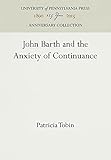John Barth and the Anxiety of Continuance / Patricia Tobin.
Material type: TextSeries: Penn Studies in Contemporary American FictionPublisher: Philadelphia : University of Pennsylvania Press, [2016]Copyright date: ©1993Edition: Reprint 2016Description: 1 online resource (200 p.)Content type:
TextSeries: Penn Studies in Contemporary American FictionPublisher: Philadelphia : University of Pennsylvania Press, [2016]Copyright date: ©1993Edition: Reprint 2016Description: 1 online resource (200 p.)Content type: - 9780812230932
- 9781512808032
- 813.54 22
- PS3552.A75
- online - DeGruyter
- Issued also in print.
| Item type | Current library | Call number | URL | Status | Notes | Barcode | |
|---|---|---|---|---|---|---|---|
 eBook
eBook
|
Biblioteca "Angelicum" Pont. Univ. S.Tommaso d'Aquino Nuvola online | online - DeGruyter (Browse shelf(Opens below)) | Online access | Not for loan (Accesso limitato) | Accesso per gli utenti autorizzati / Access for authorized users | (dgr)9781512808032 |
Frontmatter -- Contents -- Abbreviations -- The Map of Misprision -- 1. Introduction: Creative Revisionism as Career -- 2. The Floating Opera (1956): Beginning with Almost-Death -- 3. The End of the Road (1958): At the Nihilist Terminal -- 4. The Sot-Weed Factor (1960): Discontinuity Through Repetition -- 5. Giles Goat-Boy (1966): The Heroic Career, Beyond Oedipus -- 6. Lost in the Funhouse (1968) and Chimera (1972): The Hero Minors in Metaphor -- 7. LETTERS (1979): Funerary Fare-Thee-Wells -- 8. Sabbatical, A Romance (1982): Literalizing the Lateral -- 9. The Tidewater Tales (1987): Conjugality's Cartography -- 10. The Last Voyage of Somebody the Sailor (1991): Reflowering the Deflorated Virgin -- Works Cited -- Index -- Backmatter
restricted access online access with authorization star
http://purl.org/coar/access_right/c_16ec
With its control of sugar plantations in the Caribbean and tea, cotton, and indigo production in India, Britain in the eighteenth and nineteenth centuries dominated the global economy of tropical agriculture. In Colonizing Nature, Beth Fowkes Tobin shows how dominion over "the tropics" as both a region and an idea became central to the way in which Britons imagined their role in the world. Tobin examines georgic poetry, landscape portraiture, natural history writing, and botanical prints produced by Britons in the Caribbean, the South Pacific, and India to uncover how each played a crucial role in developing the belief that the tropics were simultaneously paradisiacal and in need of British intervention and management. Her study examines how slave garden portraits denied the horticultural expertise of the slaves, how the East India Company hired such artists as William Hodges to paint and thereby Anglicize the landscape and gardens of British-controlled India, and how writers from Captain James Cook to Sir James E. Smith depicted tropical lands and plants. Just as mastery of tropical nature, and especially its potential for agricultural productivity, became key concepts in the formation of British imperial identity, Colonizing Nature suggests that intellectual and visual mastery of the tropics-through the creation of art and literature-accompanied material appropriations of land, labor, and natural resources. Tobin convincingly argues that depictions of tropical plants, gardens, and landscapes that circulated in the British imagination provide a key to understanding the forces that shaped the British Empire. Beth Fowkes Tobin is Professor of English at Arizona State University. She is the author of Picturing Imperial Power: Colonial Subjects in Eighteenth-Century British Painting.
Issued also in print.
Mode of access: Internet via World Wide Web.
In English.
Description based on online resource; title from PDF title page (publisher's Web site, viewed 27. Sep 2021)


